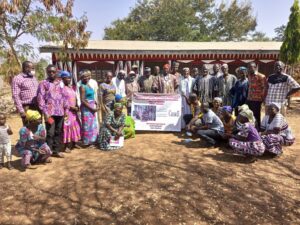Foreign culture eroding Ghanaian traditional systems of resolving conflicts – Paramount Chief
 Naba Roland Atogumdeya Akwara III, the Paramount Chief of the Sirigu Traditional Area in the Upper East Region, says the infiltration of foreign culture into the Ghanaian traditional system is making conflict resolution difficult.
Naba Roland Atogumdeya Akwara III, the Paramount Chief of the Sirigu Traditional Area in the Upper East Region, says the infiltration of foreign culture into the Ghanaian traditional system is making conflict resolution difficult.
He said unlike in the past, where traditional leaders, who were the custodians of the land, wielded power and influence to amicably resolve conflicts, the foreign cultural practices had completely replaced the Ghanaian traditional values.
This, he said, had resulted in huge sums of money being spent by the Municipal and District Assemblies on security services to maintain peace, law and order in conflict-prone areas.
Naba Akwara III made the observation at Sirigu when the Sirigu Women’s Organization for Pottery and Art (SWOPA) organized a Peace Building and Conflict Resolution programme for Chiefs, Queen mothers, Volunteer youth groups and women leaders at the Sirigu community.
The Programme under the theme” “Peace Building and Conflict Resolution: The Role of Women” which was sponsored by the Canadian Fund for Local Initiative (CFLI) was aimed at empowering the stakeholders in Conflict Prevention, Management and Resolution.
The Kassena-Nankana Municipal Assembly in September revealed that almost GHC700,000.00 was spent on security agencies that were stationed there to maintain law and order as a result of the impasse between the people of Doba and Kandiga.
This got Naba Akwara III worried and he added that “in the past traditional rulers had the power to deal with conflicts before they exploded but the inability to resolve such conflicts now is due to the infiltration of foreign culture in the Ghanaian traditional system.”
To help address the phenomenon, he underscored the need for the government, particularly the MDAs to use the traditional councils as channels for resolving such issues instead of relying on the security agencies and spending huge sums of money in resolving conflicts which the traditional rulers had the powers to deal with.
Mrs Brigit Adongo, the Coordinator of the Programme, said conflict caused the most pain to women and children who were vulnerable and impressed upon women to use their influence on their husbands and communities never to engage in conflict.
She said the Yua, Sirigu, Kandiga and Mirigu communities were noted to be conflict-prone areas in the Kassina-Nankana West District, which usually had negative effects on the socio-economic development of the district.
Mr Raymond Aiitibasa, the Assistant Coordinator of the programme, said one of the project’s objectives was to promote Intra Community and Inter-Community peace in communities, using women.
Dr Zachary Pealore, the Coordinator for the CFLI, explained that the Canadian Embassy was much concerned about conflict and that informed its decision to provide funding support for the project.
He added that the selected communities for the implementation of the programme were also informed by the closeness of the communities to the border towns of Burkina Faso, Togo, and Ivory Coast which were endemic with violent extremism.
Source: GNA
